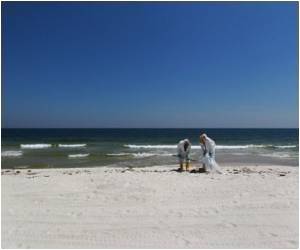
Although BP has agreed to fund $20bn - roughly equivalent to one year of BP's annual profits - reports said there could be no cap on the amount BP might be asked to contribute to the fund.
The company will pay $5bn into the fund, called an escrow fund, before the end of 2010, plus $1bn per quarter for the following three years.
The last time that BP suspended a dividend payment was during World War II. The company was due to make a $2.6bn dividend payment on Monday, which has now been cancelled.
In addition, BP said it would sell off "non-core" assets worth some $10bn in an attempt to cut costs in the coming year.
Speaking after the talks with the US President, BP chairman Carl-Henric Svanberg expressed regret over the spill, saying BP felt "sorrow and sadness for the tragic accident which should never have happened".
Advertisement
"We will live up to all our legitimate responsibilities." But many are sceptical, already its resources are overstretched and the fallout wiping billions of dollars off BP's value.
Advertisement
The company has been accused of failing to follow proper procedures in the run-up to the explosion on the Deepwater Horizon rig on 20 April.
The blast led to the deaths of 11 people, caused the rig to sink and has since seen millions of barrels of oil spew into the Gulf of Mexico.
Much of that is now washing ashore in states along the Gulf coast.
In its latest effort to contain the oil spewing into the Gulf of Mexico, BP announced on Wednesday morning that it had begun operating a second containment system designed to bring oil and gas to the surface for burning.
BP managed to place a cap over the leaking oil pipe earlier this month, and is now collecting some of the oil.
However, estimates of how much oil is gushing out of the well have again risen dramatically since the start of the crisis.
A government panel of scientists now believes 35,000-60,000 barrels are leaking each day, up from its estimate last week of 20,000-40,000.
Two troubling questions still surround BP’s pledge:
Is $20-billion enough and how much can the company afford to pay?
BP has already spent about $1.6-billion cleaning up the spill. But with the well still leaking as much as 60,000 barrels of oil a day – based on the latest government estimates – it’s hard to predict what the final tally might be.
Eventually the BP could be forced to file for bankruptcy protection in preparation for civil and criminal fines exceeding $US40 billion ($46.2bn), one of America's foremost legal scholars said.
Professor Jody Freeman, director of the environmental law program at Harvard Law School, said that without Government support BP faced an "avalanche of litigation" that threatened to cripple the oil company and could take decades to resolve in the US courts.
"It is going to be overwhelming," she said. "People within the company will now be quietly looking at possible bankruptcy as a way out."
Professor Freeman said that the US Government's decision to raise its estimate for the amount of oil leaking into the Gulf of Mexico to 35-60,000 barrels a day was potentially devastating for BP.
The figure is up to 60 times BP's initial estimate of 1000 barrels and represents a spill equivalent to the Exxon Valdez incident in 1989 every four days.
Meantime President Obama has asked Congress for $15 million in emergency funding for the new national commission investigating the oil disaster in the Gulf of Mexico.
The seven-member commission will report back by the end of the year on the causes of the disaster, as well as "options for safety and environmental precautions necessary to prevent a similar disaster from happening again," Obama wrote in a letter to House Speaker Nancy Pelosi requesting the funds.
BP managed to place a cap over the leaking oil pipe earlier this month, and is now collecting some of the oil.
However, estimates of how much oil is gushing out of the well have again risen dramatically since the start of the crisis.
A government panel of scientists now believes 35,000-60,000 barrels are leaking each day, up from its estimate last week of 20,000-40,000.
Two troubling questions still surround BP’s pledge:
Is $20-billion enough and how much can the company afford to pay?
BP has already spent about $1.6-billion cleaning up the spill. But with the well still leaking as much as 60,000 barrels of oil a day – based on the latest government estimates – it’s hard to predict what the final tally might be.
Eventually the BP could be forced to file for bankruptcy protection in preparation for civil and criminal fines exceeding $US40 billion ($46.2bn), one of America's foremost legal scholars said.
Professor Jody Freeman, director of the environmental law program at Harvard Law School, said that without Government support BP faced an "avalanche of litigation" that threatened to cripple the oil company and could take decades to resolve in the US courts.
"It is going to be overwhelming," she said. "People within the company will now be quietly looking at possible bankruptcy as a way out."
Professor Freeman said that the US Government's decision to raise its estimate for the amount of oil leaking into the Gulf of Mexico to 35-60,000 barrels a day was potentially devastating for BP.
The figure is up to 60 times BP's initial estimate of 1000 barrels and represents a spill equivalent to the Exxon Valdez incident in 1989 every four days.
Meantime President Obama has asked Congress for $15 million in emergency funding for the new national commission investigating the oil disaster in the Gulf of Mexico.
The seven-member commission will report back by the end of the year on the causes of the disaster, as well as "options for safety and environmental precautions necessary to prevent a similar disaster from happening again," Obama wrote in a letter to House Speaker Nancy Pelosi requesting the funds.
Source-Medindia









